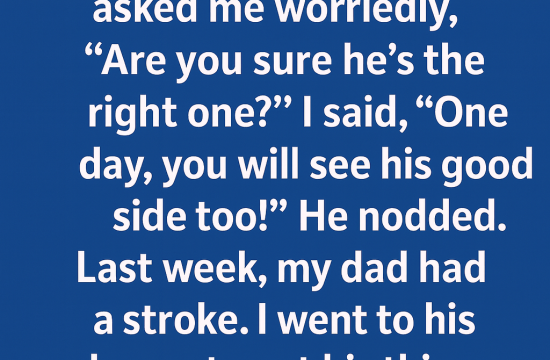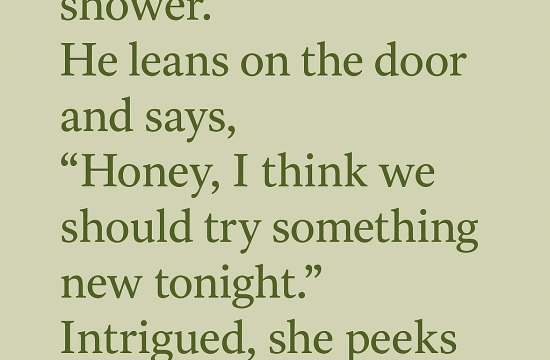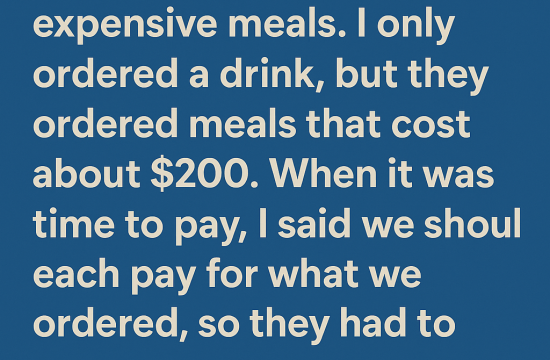Part One: The Set-Up
My son’s fiancée, Jessica, invited me to a luxurious restaurant—one where politicians sip rare wine and millionaires get their egos polished by waiters trained in Europe. I arrived in my old biker gear, grease still under my nails from the morning’s work at my garage.
Jessica greeted me with a radiant smile, her voice syrupy sweet. “You deserve this, after all you’ve done for your son.” She pulled out a chair for me. I thought maybe—just maybe—she was finally letting go of the shame she felt having a biker for a future father-in-law.
But the night wasn’t about acceptance. It was a setup.
We ordered the best steak on the menu, wine that cost more than my first motorcycle. We talked. Laughed, even. I let myself believe this might be a turning point.
Then dessert came, and she excused herself to the restroom.
She never returned.
I sat alone as the waiter placed the $3,000 bill before me. People stared. The staff whispered. I knew what she wanted—to humiliate me. To watch the cops cuff me, the old grease monkey, and drag me out in shame.
The maître d’ approached. “Sir, there’s an issue with payment?” Two security guards flanked him.
My heart pounded. But not with fear.
I reached slowly into my vest. The guards tensed.
Out came an old flip phone.
“Call my son,” I said quietly. “Tell him to bring the police. And the press, if he can.”
The manager blinked. “Sir?”
“Jessica thinks I’m a sheep,” I muttered, opening the phone. “But tonight she’s going to learn exactly what kind of wolf she poked.”
I didn’t call my son.
I called brothers.
Part Two: The Reckoning:
Jessica never saw it coming.
Minutes after I placed that call, three men walked into the restaurant—clean-cut, suit-wearing, but with the posture of soldiers and eyes that had seen war. One was the retired police chief, another a state senator, and the third owned the media group that practically ran the county.
All were once boys from my neighborhood. I taught them how to ride. Hired them for their first jobs. Helped their mothers fix leaking roofs when nobody else did.
They greeted me with hugs and silent nods of respect.
I stood slowly, reached into my vest again—and this time pulled out an American Express Centurion card. The waiter’s eyebrows shot up.
“Cover the bill,” I said. “And double the tip.”
As murmurs rippled across the restaurant, Jessica reappeared—face pale, caught in the act, expecting to see me in handcuffs.
She saw power instead.
I turned to her. “You thought you were marrying up, Jessica. Turns out you still don’t know what real class looks like.”
My son arrived shortly after, face filled with worry. I handed him a folder—copies of text messages Jessica had sent to friends mocking our family, mocking him.
“I hired a PI,” I said. “Because I protect what I build. Including you.”
Jessica’s game was over before it began.
Lesson:
That night, my son broke off the engagement.
Not out of anger.
But with the quiet strength he learned from me—not by the grease on my hands, but by the integrity I wore like armor.
As Jessica stormed out, I whispered to the maître d’:
“Don’t judge a man by the shine on his boots. Some of us polish our legacy in silence.”
And I rode home, leather vest flapping in the wind, knowing some wolves don’t need to howl to remind the forest who they are.
Ayera Bint‑e has quickly established herself as one of the most compelling voices at USA Popular News. Known for her vivid storytelling and deep insight into human emotions, she crafts narratives that resonate far beyond the page.











